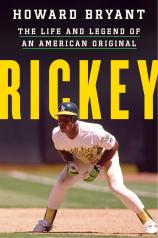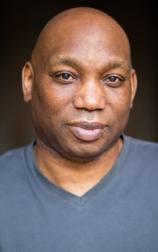Rickey: The Life and Legend of an American Original
Review
Rickey: The Life and Legend of an American Original
“For when the One Great Scorer comes to mark against your name, He writes --- not that you won or lost --- but how you played the Game.” So said Grantland Rice, knight of the keyboard, and I think it says something that Rice cast the Almighty not as a sportswriter but as the official scorer (setting aside the fact that the official scorer in Rice’s day usually was a sportswriter).
So the job of the sportswriter is to tell the story of the game. The sportswriter is analog. He tells you who won and who lost, but also how and usually why. And if some of the sportswriter’s biases get in the way, well, what do you expect?
"Howard Bryant maintains that Henderson was a singular talent, misunderstood in his era, whose place in baseball history should be forever secure. RICKEY, to borrow a phrase, is intensely and satisfyingly entertaining."
But that’s not what the official scorer does. The official scorer is digital. He reduces the game to its constituent numbers. The output of the sportswriter is the story. The output of the official scorer is the box score. And as the late great Roger Angell said about the box score, “It is a precisely etched miniature of the sport itself, for baseball, in spite of its grassy spaciousness and apparent unpredictibility, is the most intensely and satisfyingly mathematical of all our outdoor sports. Every player in every game is subjected to a cold and ceaseless accounting; no ball is thrown and no base is gained without an instant responding judgment --- ball or strike, hit or error, yea or nay --- and an ensuing statistic.”
What Howard Bryant is doing here in his biography of Rickey Henderson is to assert the primacy of the box score over the sportswriter’s craft. He counterpoints his review of Henderson’s career with quotes from the sportswriters of the day. Well, maybe “quotes” aren’t what they are; “criticism” is more like it. Henderson, they say, was an underachiever. He didn’t want to play every day, and when he did play, he was a hot dog. Not a team player, not making the most of his talent.
Bryant has two points to make about all of this. The first is that the press box of the era was overwhelmingly white, and Henderson’s race played an outsized role in how he was perceived --- that their racial biases caused them to misinterpret and misunderstand what Bryant calls “Rickey Style.” But that’s the analog side of things. Bryant goes on to point out that Henderson’s career numbers belie every criticism of him. First in stolen bases. First in runs. First in walks when he retired, currently second behind Barry Bonds. Three thousand hits. (Bryant asks, “What was Rickey supposed to do, get four thousand hits?”)
There is, I suppose, a way to tell the Rickey Henderson story that focuses on his perceived eccentricities. Bryant is not going to give us that account, and we really shouldn’t expect him to do so. This is a sociological document, taking as its starting point the Black migration from the Deep South to Oakland, and weaving in Henderson’s story with those of other Bay Area athletes of his generation.
What the Great Scorer would say about Rickey Henderson, I cannot say. Bill James said that if you cut his career in half, you would have two Hall of Fame players. Howard Bryant maintains that Henderson was a singular talent, misunderstood in his era, whose place in baseball history should be forever secure. RICKEY, to borrow a phrase, is intensely and satisfyingly entertaining.
Reviewed by Curtis Edmonds on June 24, 2022
Rickey: The Life and Legend of an American Original
- Publication Date: June 13, 2023
- Genres: Biography, Nonfiction, Sports
- Paperback: 448 pages
- Publisher: Mariner Books
- ISBN-10: 0063268663
- ISBN-13: 9780063268661




